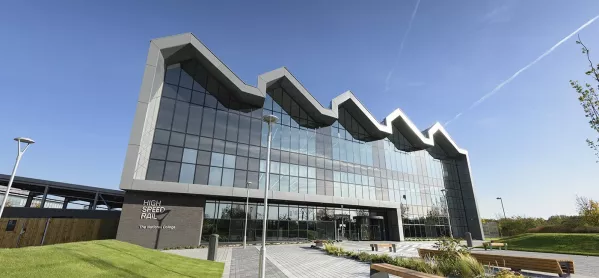Radical change is urgently required at the National College for Advanced Transport and Infrastructure (NCATI), a further education commissioner (FEC) report has said today.
The college is in a “very challenging financial position” and would be about to run out of cash if it were not for the Department of Education (DfE) providing emergency funding, the report adds.
It says: “There is no credible plan in place to resolve this issue and it is clear that the current business model operated by the college will not provide financial sustainability.”
The news comes as Ofsted has published a separate inspection report, with the institution graded “inadequate”.
Background: £120m national colleges beset by low recruitment and delays
More: Government invests £80m in national colleges
News: National College with 24 students criticised by Ofsted
The college was established in 2015 to provide technical skills required to build, operate and manage HS2 and other rail projects. It opened to learners in September 2017 and was one of five planned National Colleges, which have been beset by recruitment and financial challenges.
The college, which has campuses in Birmingham and Doncaster, was issued with a notice to improve by the Education and Skills Funding Agency on 13 January 2020, and referred for FEC-led assessment shortly after.
'Ongoing shortfall in the college’s finances'
The FEC report says: “The intake of learners to the college has been highly dependent on the roll-out of the HS2 project, which was expected to create up to 40,000 new jobs and require around 2,000 apprentices on an ongoing basis.
“These numbers of learners have not materialised and the college has been unable to recruit learners from other sources. This has created an ongoing shortfall in the college’s finances.”
It also criticises the board for not forming a finance committee and recommended that it does so urgently. The report says that while the board had been meeting monthly to discuss the finances, these were not formally scheduled meetings.
It adds that minutes of board meetings have not been published and placed on the college’s website since December 2018.
The report says that there are 12 senior management roles, which alone have a “gross cost of around 72 per cent of income; an exceptionally high overhead cost to carry”.
It adds: “While the executive team have made some cost reductions, there is a reluctance by the board to cut costs deeply. The management team are of the view that the existing staff cost base is required to meet the needs of the business should the learner numbers start to rapidly increase.
‘Very poor financial position’
“However, this has been the case for some time now and has to be balanced against the very poor financial position and a future reliance on emergency funding to continue operations. It is the FEC team’s view that management can and should do more to minimise the ongoing financial losses.”
Meanwhile, the Ofsted report, released today, said that managers and staff “do not act quickly enough to protect apprentices from harassment” or “ensure that apprentices receive the help, protection and support that they need”.
Trainers “do not effectively plan and coordinate learning at NCATI with that occurring in the workplace”, resulting in a “disconnected and poor learning experience” for many apprentices.
While high-quality training is provided for many apprentices, this comes from employers, with the college “rarely involved in such matters”.
Apprentices “do not receive detailed or informative guidance on the expectations and demands of their course”, with the majority unaware of their target grades and not understanding what knowledge and skills are required.
A DfE spokesperson said: “We are aware that the National College of Advanced Transport and Infrastructure has been judged inadequate by Ofsted.
“Our priority now is to minimise disruption to students and employers. We are working closely with the college and the FE commissioner to ensure students can continue their training and to deliver a long-term sustainable solution so the transport and infrastructure sector can access the skilled workforce they need for the future.”





